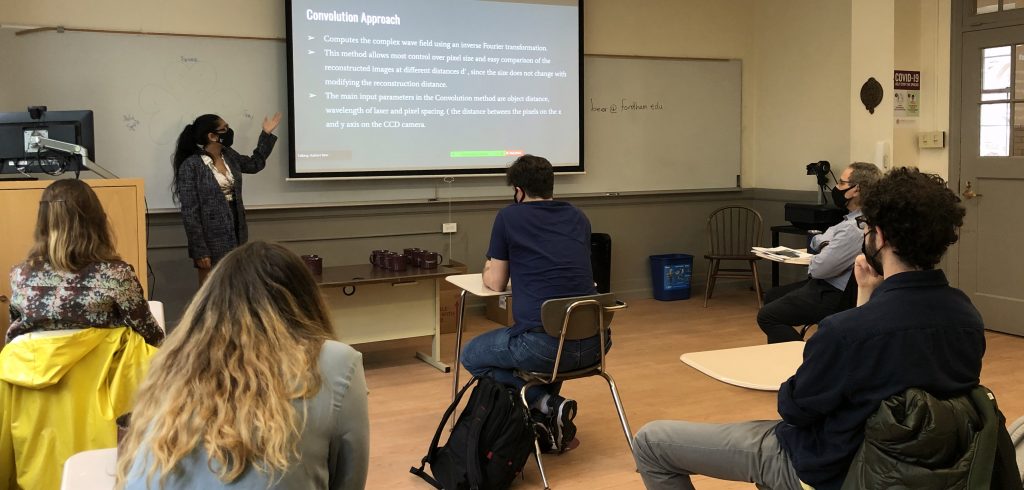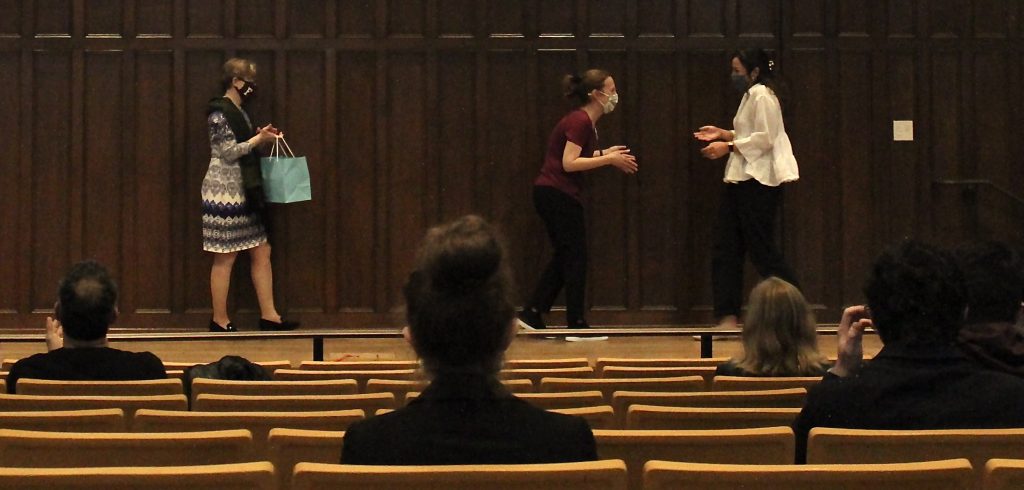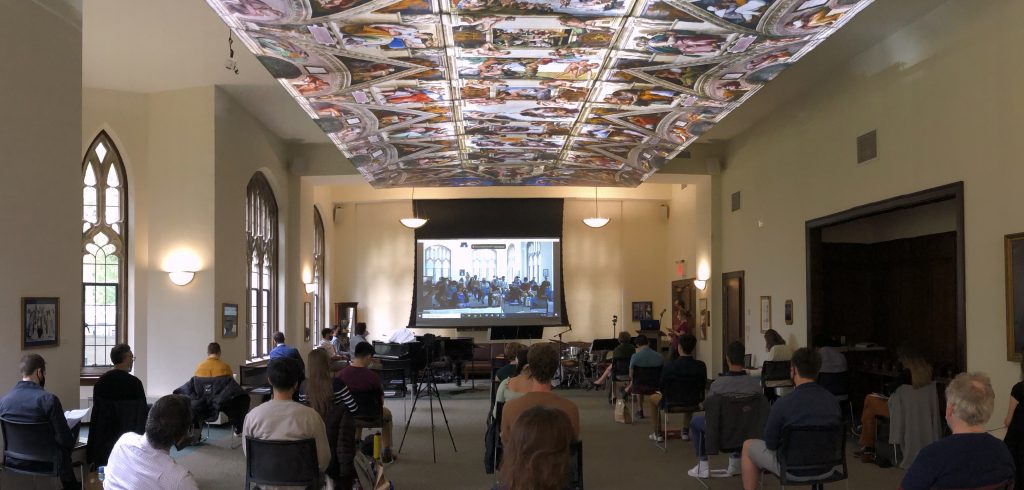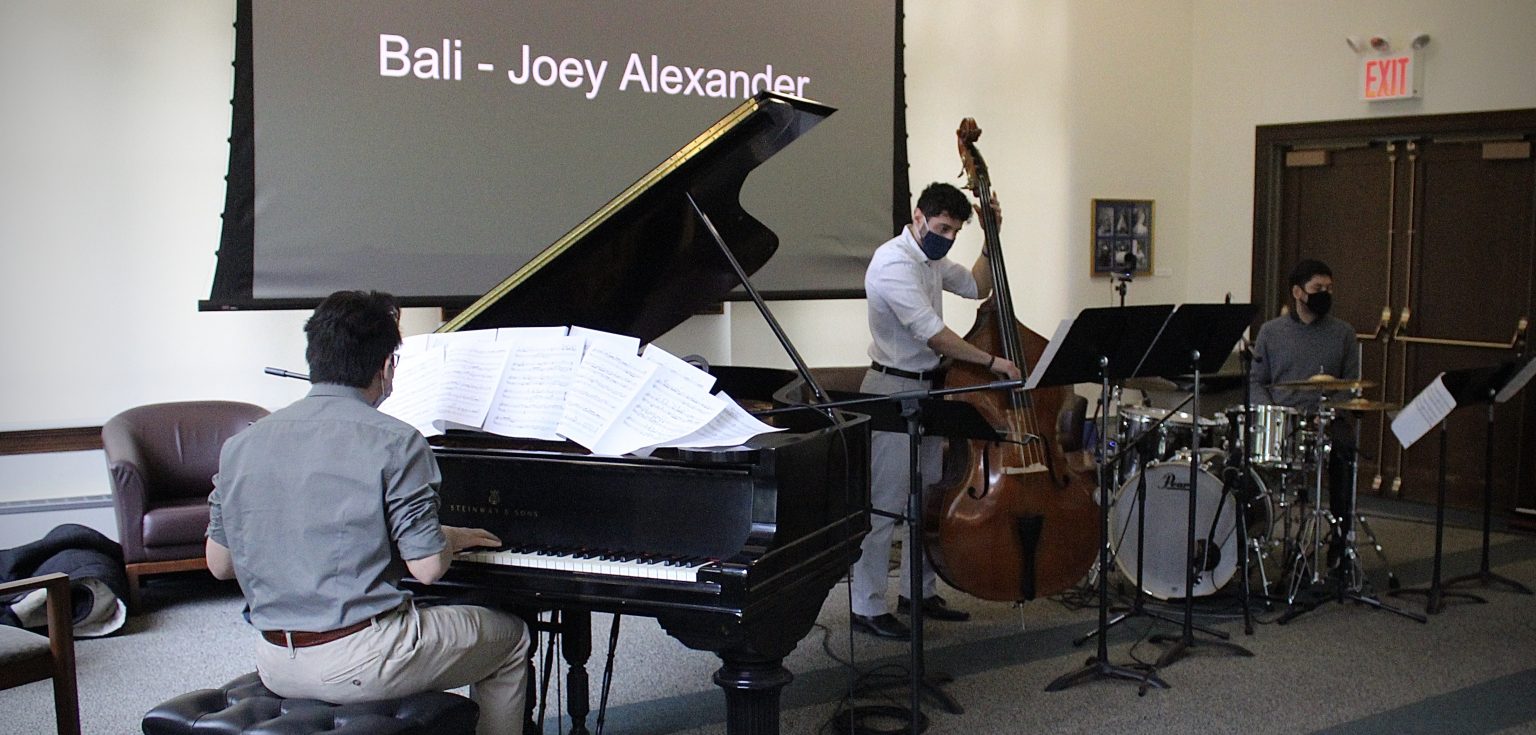“It seems like 14 years since we last gathered to celebrate, in person, your amazingness,” Maura Mast, Ph.D., dean of Fordham College at Rose Hill, told students and faculty mentors in Keating Hall’s first floor auditorium on May 5. “I’m so grateful and happy that we’re here today.”
In his congratulatory remarks to students and faculty, Dennis Jacobs, Ph.D., provost and senior vice president for academic affairs, recalled when he was an undergraduate who landed his first research opportunity through a faculty mentor.
“I really fell in love with the process of discovery and research because someone gave me a chance,” said Jacobs, who has a research background in chemistry and physics. “You’ll look at the world differently because of the experiences you have engaged through research.”
This year, more than 200 students shared their projects through in-person presentations in Keating Hall classrooms, live Zoom sessions from their homes, and pre-recorded videos available online. Their research spanned many fields, including health sciences and technology, healing and well-being, COVID-19, and anti-racism and social justice.

Asian Music and Jazz
The symposium kicked off with a live concert performed by Miguel Sutedjo, FCRH ’23, an Indonesian American jazz pianist, and two classmates in Butler Commons. Sutedjo’s project explored how Asian and Asian American musicians blend jazz with Asian sounds to create a unique style of music.
“I wanted to investigate the music of other great Asian American and Asian jazz musicians in order to understand my positioning within this art form,” Sutedjo said, addressing more than 30 students and faculty members seated in chairs spaced six feet apart.
Transitioning to Adulthood in A Pandemic
In a Keating classroom, several students presented research on community and environmental health. Valeria Venturini, a senior at Fordham College at Rose Hill who studies anthropology and psychology, analyzed factors that shape the decisions of young American adults who are considering moving out of their childhood homes, especially during the pandemic. She interviewed six Fordham students and found that financial concerns in today’s economy were stronger factors in delaying a move than the pandemic. The young adults were motivated to move out because of independence and the ability to make their own decisions without parental consent, but some students, especially second-generation American males, felt pressured by their families to stay at home or close to home.
“Not a lot of research is being done about this in the United States,” Venturini said. “The intersection of cultural values, economic status, and mental health in this population of emerging adults should be looked at further.”
Learning How Rice Adapts
Colleen Cochran, a senior at Fordham College at Rose Hill who studies economics, environmental studies, and sustainable business, examined the genes of rice—one of the most important crops worldwide—to better understand how the plants might respond to the increasing threat of climate change. Cochran and her co-authors hypothesized that more diverse genes make rice more resilient to environmental change. After analyzing existing data on 230 types of rice that were subjected to drought, they found that the plant’s ability to adapt to different environments was not strong.
“Rice probably feeds more people in the world than any other crop, so understanding how it [responds to climate change]… is extremely important in global food security,” said Cochran, who served as a 2019 Fordham-New York University research intern and a Udall scholar.
Cochran was honored by the Fordham College Alumni Association for her dedication to undergraduate research, along with two faculty mentors: Edward Dubrovsky, a biological sciences professor, and Mark Naison, professor of history and African and African American studies.

Pride: Not Always a Deadly Sin
At the end of the symposium, Rachel Annunziato, Ph.D., associate dean for strategic initiatives, played a video montage with photos of this year’s more than 60 faculty mentors and the ’90s classic “Simply the Best” by Tina Turner playing in the background, while students in Keating Hall’s first floor auditorium cheered and applauded. Finally, Joseph M. McShane, S.J., president of Fordham, lauded the mentors and mentees for their tenacity during a difficult year.
“I know that pride is one of the deadly sins, but in the case of Fordham pride, it’s actually a virtue. And on this day, you have every reason to be very proud,” Father McShane said, addressing his audience live from Zoom. “My heart is filled with gratitude to you for your courage, your desire for knowledge, and all that you have done this year.”


